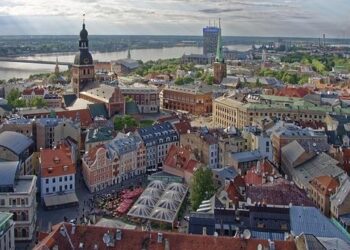In a decisive move reflecting ongoing geopolitical tensions, Latvia has officially banned real estate purchases by Russian and Belarusian citizens, according to the Odessa Journal. The new legislation aims to curtail foreign influence and protect national security amid escalating conflicts in the region. This policy shift marks a significant development in Latvia’s approach to property ownership and international relations, drawing attention from investors and diplomatic circles alike.
Latvia Implements Comprehensive Ban on Real Estate Acquisitions by Russian and Belarusian Nationals
In a decisive move reflecting growing geopolitical tensions, Latvia has enacted legislation that prohibits Russian and Belarusian nationals from purchasing real estate within its borders. The regulation, which took effect immediately, aims to safeguard national security and curb potential economic influence stemming from these countries amid ongoing regional conflicts. Authorities have emphasized that this ban covers all categories of real estate, including residential, commercial, and agricultural properties, with stringent penalties for violations.
Key provisions of the ban include:
- Complete restriction on property acquisition by individuals holding Russian or Belarusian citizenship.
- Mandatory reporting obligations for real estate agencies and notaries to verify buyer eligibility.
- Exemption clauses for entities registered outside Russia and Belarus but controlled by nationals from these countries require special government approval.
| Property Type | Ban Status | Penalty for Violation |
|---|---|---|
| Residential | Prohibited | Up to ‚ā¨150,000 fine |
| Commercial | Prohibited | Up to ‚ā¨300,000 fine |
| Agricultural Land | Prohibited | Property seizure and fine |
Impact of the Real Estate Purchase Ban on Latvian Property Market and Regional Security
The Latvian government’s decision to prohibit real estate purchases by Russian and Belarusian nationals marks a significant shift in the property market dynamics and broader regional security landscape. By restricting direct foreign investment from these countries, Latvia aims to curb potential economic leverage that could be exercised through real estate acquisitions, especially in strategically sensitive areas. Property developers and agencies have reported an immediate cooling in transactions involving non-EEA buyers, resulting in a short-term adjustment period characterized by a decline in demand for luxury apartments and commercial spaces in Riga and other major cities.
Beyond economic repercussions, the ban signals heightened vigilance toward safeguarding national sovereignty and deterring potential covert activities. Experts highlight several anticipated effects, including:
- Reduced opportunities for using real estate as a cover for intelligence gathering or influence operations.
- An increased focus on transparency and compliance within the Latvian property sector.
- Greater collaboration with regional neighbors to align security measures tied to foreign investments.
| Impact Category | Short-Term Effects | Long-Term Outlook | ||||||||||
|---|---|---|---|---|---|---|---|---|---|---|---|---|
| Property Market | Decrease in Russian/Belarusian buyer interest | Market stabilization with diversified investor base | ||||||||||
| Regional Security | Heightened monitoring of foreign investments | Improved resilience against external influence | ||||||||||
| Guidance for Affected Buyers and Real Estate Stakeholders Navigating the New Restrictions Buyers from Russia and Belarus now face significant legal hurdles when considering real estate investments in Latvia. It is crucial for affected individuals to consult with local legal experts to understand the nuances of the ban and explore alternative options such as lease agreements or indirect ownership via approved entities. Real estate agents and financial institutions should update their compliance protocols immediately to avoid inadvertent violations. Transparency and thorough due diligence will become indispensable in navigating these changes effectively. Key recommendations for stakeholders include:
In ConclusionThe Latvian government’s decision to prohibit real estate acquisitions by Russian and Belarusian citizens marks a significant development in the region’s response to ongoing geopolitical tensions. As the situation continues to evolve, authorities emphasize that this measure aims to protect national security and economic stability. Observers will be closely monitoring how this ban impacts both the local property market and broader diplomatic relations in Eastern Europe. Further updates are expected as Latvia implements and enforces the new regulations. ADVERTISEMENT |
















